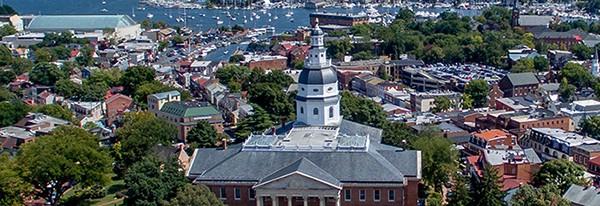Date:
Source: Capital Gazette, E.B. Furgurson III
Former Charleston Mayor Joe Riley helped frame the effort to rethink City Dock before a packed house at Maryland Hall as work continued on the broad discussions to fashion the city waterfront’s future.
“Don’t make stupid mistakes. It’s is hard not to do. You must remain vigilant … Put your city in the context of time, because you are creating something for generations.”
“You have to keep the buildings, the texture … the human scale. You have to keep the memories alive, you have to keep the sense of place.”
His talk Monday night was focused on general themes about reinvigorating and reimagining urban cultural landscapes. Some of Riley’s comments could have been pulled from the most recent study city leaders have embraced.
The Urban Land Institute report encouraged reimagining City Dock adding park space, encouraging investing in redevelopment and new activities while maintaining existing zoning and addressing sea-level rise. It also suggested a working group of stakeholders like the City Dock Action Committee which met again Thursday night.
Riley, who served a nearly unheard of 10 terms in office, told the story of his home city and how with his guidance, and at times stubbornness, the grandest city of the antebellum South was resurrected after years of neglect and economic hardship.
The city benefited from the continuum of his 40-year tenure as it kept its commitment to historic preservation while addressing urban issues of economic decline and stratification.
But it was grounded in a deep commitment to beauty, place, memories and public-private partnerships.
“Civic engagement connects the city to its citizens. That is why we do what we do, to create this sense of pride,” Riley said.
Riley said the process the city is currently undertaking is laudable, with the recent report of the Urban Land Institute on renewing City Dock being embraced by Mayor Gavin Buckley and preservation minded like Historic Annapolis president and CEO Robert Clark, who were once at odds over the future of the waterfront area.
“I salute the process you are in and I have faith it will yield extraordinary results,” Riley told the audience Monday night.
Like Charleston, Annapolis has years ago stepped up to preserve the past via Historic Annapolis and a web of efforts to maintain the buildings and history that makes it unique.
Mistakes have been made over the years in both cities. Riley pointed to at least one in his extensive slide presentation, such as tearing down the historic Hotel Charleston – where the Democratic Convention of 1860 was held – in favor of a drive-in motel.
Riley warned avoiding mistakes is paramount, especially true when it comes to the relatively small area of City Dock.
Parking has been a thorn in the side of city planning for generations. Now one goal of the reimagined City Dock is to turn some of the parking along Dock Street abutting Ego Alley into usable space like a park.
Clark was enthused about some of the discussions Thursday when four of the City Dock Working Group’s subcommittees presented findings including parking.
“The bottom line is you want to have parking for the right people at the right time,” he said. “Why have a bus boy, nothing against bus boys, at a meter all day when a store customer wants to run in and buy something? Dynamic pricing could be the answer.”
The biggest ticket item is rebuilding Hillman Garage off Main Street.
“No. 1 is to take Hillman down and rebuild it,” Clark said. “And we learned there is a way to do that. Increase capacity from 450 cars to 700 – the difference is more than all the cars parked around City Dock and on Main Street.”
Buckley is hoping that will work out.
“We have to add capacity before we take away capacity,” he said Friday. “With all the smart people we have working on it we will figure a way to get those infrastructure needs for the city.
And we might be able to do it without taxpayer dollars.”
Riley also talked about making decisions to include everyone from every income level.
He noted how some are fortunate, and have been able to travel to see great places in the world like Paris. But many residents will never have that opportunity. “Their hometown is all they will see. So if you can make that beautiful to them, then you will make it beautiful for everybody,” he said.
Riley fought many battles trying to keep structures and turn many into attractive public housing. One house was about to be torn down, it was leaning and about to fall into the neighboring home. Riley said no, preserve it. And the city did.
Then other homes in the immediate area were improved, some in Section 8 housing, some full market. The neighborhood blossomed. “All because we didn’t tear down that one house,” Riley said.
“What Mayor Riley said is everything I think about every day,” Buckley said. “Making public housing good, make it beautiful. Make public spaces beautiful for everyone, rich and poor, old and young, black and white.”
“With that you make a better community, that was my big takeaway.”
Buckley and Clark are both encouraged about the energy being put into rethinking City Dock, noting the pro-bono hours being put in by professionals would be worth hundreds of thousands of dollars.
“Here are all these thoughtful people … doing it for their city,” Clark said.
The mayor concurred. “I do think that we have so many people involved moving in the same direction – environmentalist, historic preservation, the city, the Naval Academy, local businessmen – all at the table. I really think this is the moment.”
The City Dock Action Committee is expected to conclude their work and present it to the City Council in the fall.
To view this article on The Capital’s website, please click here.


